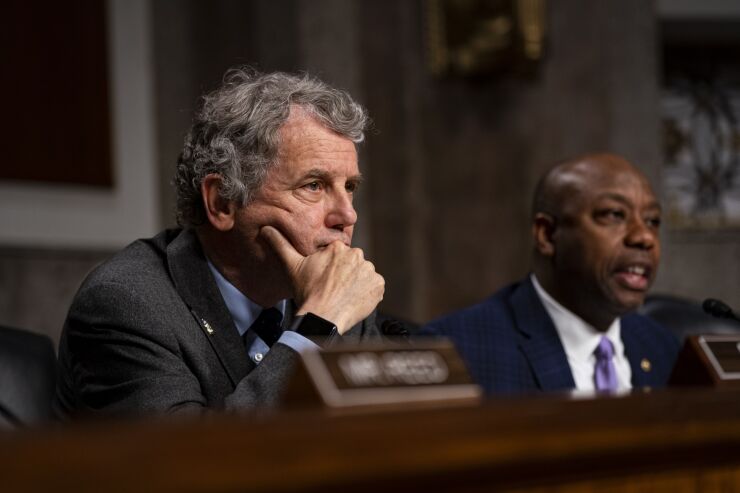
The Senate Banking Committee is scheduled to vote Wednesday on a bipartisan bill that would broaden the Federal Deposit Insurance Corp.'s authority to claw back compensation from executives of failed banks.
The legislation was introduced this week after Senate Banking Committee Chair Sherrod Brown, D-Ohio, reached an agreement with ranking member Tim Scott, R-S.C.
It would give the FDIC the ability to claw back compensation received by executives from up to 24 months before a bank's failure. That would include incentive-based, equity-based and performance-based compensation, plus any money the executive made from selling shares of the bank. The clawback provisions would not apply to community banks.
The bill would also increase the maximum penalties that regulators can impose on executives who "recklessly" violate the law.
"It's time for CEOs to face consequences for their actions, just like everyone else," Brown said in a statement.
The bill is the latest in a series of proposals that seeks to recover money paid to senior bank executives in the event of another bank failure. Making it easier for regulators to recoup such compensation is one of the few issues that has gained bipartisan support in the wake of
The failures of Silicon Valley Bank, Signature Bank and First Republic cost the FDIC's Deposit Insurance Fund a total of $31.5 billion.
Sen. Elizabeth Warren, D-Mass., introduced a bill to strengthen executive-compensation clawbacks in late March, weeks after the failures of Silicon Valley Bank and Signature Bank, and before the failure of First Republic.
That bill would have required regulators to recoup five years worth of pre-failure pay from bank executives;
The bill introduced by Brown and Scott this week would give the FDIC the option, rather than require the agency, to claw back pay from executives at failed institutions.
"The clawback must be mandatory, not left to the discretion of what could be industry-friendly regulators," Bartlett Naylor, financial policy advocate at the advocacy group Public Citizen, said in a statement.
In addition to broader clawback authority, the bill from Brown and Scott would increase the maximum monetary penalty —from $1 million to $3 million — for bank executives who recklessly violate the law or engage in unsafe and unsound practices.
The FDIC would also have increased power to remove bank officials from their posts and bar them from working in the industry. As currently written, the bill covers senior executives and certain directors, but not board members.
Any clawback legislation should cover a wider group of bank officials, namely members of the board, said Dennis Kelleher, head of the advocacy group Better Markets. All executives at banks that were forced to sell to avoid failure should also be subject to clawbacks, Kelleher said.
It is too soon to tell whether the latest legislation would have been successful at recouping pay from executives at the banks that failed this spring, Kelleher said. He predicted that any proposed legislation will go through multiple iterations before becoming law.
"It's going to be extremely tough to get an appropriately strong clawback bill through this Congress and signed by the president because of the power and influence of the financial industry, which will spare no expense to kill this bill or any similar bill," Kelleher said.
The Consumer Bankers Association declined to immediately comment on the proposed legislation.
Members of Congress from both sides of the aisle have questioned the former CEOs of all three banks that failed this spring, pressing them on their rates of uninsured deposits and on short-sighted bets that lawmakers said were designed to maximize profit.
Becker took home $10 million in 2022 and $10 million in 2021, according to regulatory filings. Former Signature CEO Joseph DePaolo's compensation totaled almost $8 million in 2022 and $9 million in 2021. At First Republic, former CEO Michael Roffler took home about $7 million in 2022, his first full year as CEO.
When Becker was asked by Warren how much of his 2022 compensation he would be willing to part with, he made no such commitment.
"Senator, I promise to cooperate with the regulators," Becker told Congress in May. "I know there's going to be a process review of compensation."






